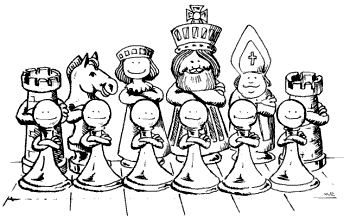| mind games |

Philip Joy, who it is generally acknowledged wrote the first worthwhile ZX-80 chess program, begins a series of articles on that game and the many others which stimulate the brain as well as being of immense fun
THERE are now many versions of chess for the ZX-81, which proves how popular the game was. I do not intend to review those versions as that would be unfair, because I wrote a ZX-80 version, but I would like you to send any games you have played with those versions, noting your likes and dislikes. We can compare the versions and see what, if anything, is wrong.
We shall probably notice that the same type of problem appears with all the versions. I can then explain why those problems might exist and you could then reply with your comments.
It is known that a computer cannot play the end game very well; the dedicated chess computers on the market have shown that to be true. I have played against Chess Challenger and that shows how well it can play at the start. The production of good openings, by storing standard moves, is a common practice.
Even at the middle game, it shows large amounts of skill. As the game draws to a close, however, the dramatic decrease in skill is noted. The reason is clear; the number of ways in which a game can end makes it very difficult to put standard moves for it into the computer.
If you had a large mainframe computer with its large amount of storage, you could begin to investigate the end game. That has little to do with the dedicated chess machine and even less to do with the ZX-81 but it shows that it is all a matter of storage space.
In a 16K ZX-81 the standard of play is a reflection of the program. The speed of the compactness of program will change only in real terms when you move from Basic to machine code.
The standard of play therefore, I feel, is changed only by how compact the program is. A strong game is a reflection of how compact and therefore how well-written it was. The market for the ZX-81 versions is strong and I would imagine new or updated versions will follow thick and fast.
Keeping in mind what I have said, will an update be so much better? If so, think what must have been done to make it better. If you have one of those updates and you have the old copy, send your views on the update compared to the old version and say whether you think the update is much better than the old one.
In future issues I shall include some of the best letters concerning what I have asked and I will answer them with some reasons why things are as they are. Of course, I hope that some of you are thinking of starting, or are even halfway through your own chess program. You may be interested only in the middle game, or how to obtain the best graphical board; if so, send them. I shall be providing from time to time hints and perhaps portions of my programs.
By what I have asked you to send, we should be able to know everything about the version on the market. I shall hope to include portions of any routines you send, including my own, to provide a set of routines, which may, in the end, produce a chess program.
If that happens, we will all have a chess program built by you, the readers. In the end this page will become a watchdog for chess programs and a library of routines, which I hope could be turned into a working program and printed.
Chess Challenger is copyright by Fidelity Electronics.